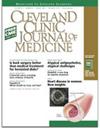胰高血糖素样肽-1受体激动剂和胰腺炎:可调和的离婚。
IF 4.1
4区 医学
Q1 MEDICINE, GENERAL & INTERNAL
引用次数: 0
摘要
早期临床试验表明,接受胰高血糖素样肽-1 (GLP-1)受体激动剂治疗的患者发生急性胰腺炎的风险略有增加。因此,临床医生避免在有急性胰腺炎病史的患者中使用GLP-1受体激动剂。然而,最近对临床试验数据的大型荟萃分析并不支持全班级风险。否认这些有胰腺炎病史的患者有价值的治疗药物似乎是没有根据的。本文章由计算机程序翻译,如有差异,请以英文原文为准。
Glucagon-like peptide-1 receptor agonists and pancreatitis: A reconcilable divorce.
Early clinical trials suggested that patients treated with glucagon-like peptide-1 (GLP-1) receptor agonists had a slightly increased risk of acute pancreatitis. Consequently, clinicians have avoided using GLP-1 receptor agonists in patients with a history of acute pancreatitis. However, recent large meta-analyses of clinical trial data do not support a class-wide risk. Denying these valuable therapeutic medications to patients with a history of pancreatitis seems unwarranted.
求助全文
通过发布文献求助,成功后即可免费获取论文全文。
去求助
来源期刊

Cleveland Clinic Journal of Medicine
医学-医学:内科
CiteScore
3.80
自引率
0.00%
发文量
109
审稿时长
6-12 weeks
期刊介绍:
The mission of Cleveland Clinic Journal of Medicine (CCJM) is to provide its readers with up-to-date, practical, clinical information relevant to internal medicine, cardiology, and related fields. Consistent with this mission, CCJM focuses on timely review articles and other content that has a continuing-education orientation rather than on original research or case reports. CCJM authors, drawn from Cleveland Clinic and other top medical institutions throughout the world, are asked to identify new findings that are changing the practice of medicine and to advise readers how to apply them in daily patient care. Authors are chosen for their experience, acquired through caring for patients, teaching other physicians, and researching clinical questions.
 求助内容:
求助内容: 应助结果提醒方式:
应助结果提醒方式:


